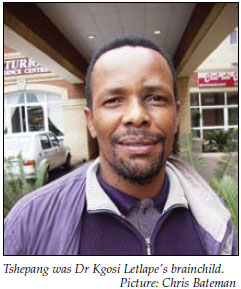Services on Demand
Article
Indicators
Related links
-
 Cited by Google
Cited by Google -
 Similars in Google
Similars in Google
Share
SAMJ: South African Medical Journal
On-line version ISSN 2078-5135
Print version ISSN 0256-9574
SAMJ, S. Afr. med. j. vol.100 n.8 Pretoria Aug. 2010
IZINDABA
'Want private sector help? Make state health care managers accountable'

Well-off government health care managers are neither directly affected by the dysfunctional public system they run nor are they held accountable for 'deliverables', leaving them with 'absolutely no incentive' to partner with the private sector.
That's the opinion of Dr Kgosi Letlape, a former President of the World Medical Association, who founded the HIV/AIDS NGO, the Tshepang Trust, during his recent 9-year tenure as Chairman of the South African Medical Association (SAMA).
The Tshepang Trust was set up by SAMA almost a decade ago to initially address, in Letlape's words, 'the duality of some people having any treatment they want on one side, and a policy of non-(AIDS) treatment on the other'. Izindaba learnt that the Trust's struggles to bring its private expertise to the public health care delivery table have made little progress in spite of a dramatic change in government HIV/AIDS policy and a massive health testing and counselling campaign.
Letlape believes that if South African public health care managers were held accountable for delivering measurable services, their reluctance to accept private sector offers of help would undergo a sudden transformation. He said the 'crux of the matter' was that public sector facility managers were not judged on delivering services to people, nor were they dependent on the services they ran for their own health care. 'So if it's not a deliverable in terms of their job and they're not personally affected by the lack of care, how do we expect them to engage with us?' he asked.
One of nine provinces accepts Tshepang's help
Through its Workplace Intervention Programme (WIP), Tshepang has enrolled 484 private doctors, 100 of whom have over the past 3 years enrolled 2 531 patients for HIV care nationally with 65% of patients having begun antiretroviral therapy (ART).
In Gauteng, the only province so far to sign a Memorandum of Understanding (MOU) with the Trust, 12 070 patient visits were recorded last year and 1 346 patients initiated on HAART via 21 GPs doing sessional work at five public health facility sites. This means that 11% of all patient visits by these 21 GPs have translated into initiations.

Head of Project Management and Operations, Pumla Mahuma, says although the Trust has operations in other provinces, the highly effective GP sessional model needs an MOU to convince funders and win the trust of public health care facility staff (i.e. have an official stamp of approval from 'head office'). She said some progress in setting up MOUs was currently being made in the Free State, KwaZulu-Natal and Mpumalanga, but elsewhere their offers of sorely needed help continued to fall on deaf ears.
Repeated attempts by herself and Letlape to speak to heads of department and Health MECs to secure MOUs in other provinces had yielded little fruit.
Accepting outside help 'like doing us a favour'
'We've knocked on a lot of doors offering the sessional work and suggesting they refer initiated and stable HIV patients to GPs' rooms, but it's like they're doing you a favour,' she observed.
The MOU consists of Tshepang paying private GPs to deliver services in public ART sites for 2 years, after which the relevant provincial health department takes over their payment, with the Trust continuing to manage the project.
'The President's Emergency Plan for AIDS Relief (PEPFAR) doesn't have to give us money (R22 million per annum and dropping as USA budgets tighten). We exist because there's a gap and government's efforts to bridge that gap are simply not enough; they need the help of NGOs and the private sector. We're taking patients on because they're dying in the queues through lack of infrastructure and human resources,' Mahuma emphasised.
Dr Gustaaf Wolfaardt, Managing Director of SAMA's Foundation for Professional Development (FPD), which, through PEPFAR funding, partners with 60 government clinics and has supported the ART initiation of some 100 000 patients, believes unwillingness by any senior provincial health official to sign an MOU 'can only mean they are incompetent'. 'I mean ... somebody shows up at your doorstep and offers to spend millions improving services, staff and people under your control. I think another reason is that senior managers have figured out that if you don't do anything you can't get into trouble - it's part of the Manto legacy.'
Wolfaardt said fixing the state health care sector should begin with a management qualifications audit, followed by a competency audit ('can they write a business plan?'), resulting in 'all the dead wood being chucked out' before posts were competitively re-advertised 'without cronyism or party loyalty' playing any part. He said some 80% of all public sector patients on ARVs were now being supported by PEPFAR's 200 South African NGO partners - to the tune of some R7 billion per annum.
PEPFAR applied rigid rules in appointing partners which included forensic audits for any partners receiving more than R75 million per annum and strict service delivery criteria. Said Wolfaardt: 'It's schizophrenic; we can do a spectacular job of hosting the World Cup on the one hand, but on the other run hospitals which our health minister refers to as death traps. The difference is that in the World Cup everyone participated and appointments were made on competence.'
Mahuma said an official mindset they all too often encountered was that NGOs were there because they needed to use the funds they had. She calculates that if 6 000 private GPs trained in the management of HIV/AIDS did paid work for Tshepang, each treating 500 patients per annum, the country would easily be able to cater for the estimated 3 million ARV-eligible people.
Wolfaardt agreed, adding that the FPD had trained 16 000 medical practitioners in HIV/AIDS management, meaning that virtually every South African GP was now clinically HIV competent. Outsourcing ARV programmes to the private sector with rigid controls and an electronic smart card system for patients would make it 'an immediate success'.
He calculated that 'huge savings' could be made and another million patients put on ARVs within a year if even 5 000 private sector doctors saw 200 patients each per annum (each patient once per quarter). One GP would only have to see 4 more patients (than usual) per day to achieve this and it would cost R2 billion, with government supplying drugs and laboratory services. At present it was costing R15 billion (half from PEPFAR and half from government) to get a million patients on treatment (at the new CD4 cell count threshold of 350).
'I don't think it's affordable to run this through government systems only. The private sector is the low-hanging fruit - you can then focus more government resources on the rural areas,' he added. Statistics revealed that 30% of HIV-positive men were 'electing to die rather than go for treatment', so visiting a local GP would help in 'virtually eliminating' this stigma.
The Tshepang Trust offers three models: private GPs treating at provincial ART sites (sessions), a workplace intervention programme (WIP) where private GPs see workers referred from small, medium and micro enterprises (SMMEs), from the public health care staff sector and by teacher unions (to their rooms), and a Stop HIV campaign that conducts awareness campaigns, train-the-trainer workshops and interactive sessions with participants (15 550 people trained in the 'Stop HIV' message so far).
Letlape acknowledged the government's acceleration in getting 900 000 people on ART, 'from a baseline of zero', but stressed that in that 5-year period there had been some 2 million preventable AIDS deaths. 'We're (as a country) not responding to people's needs but to pressure and we're still only reaching less than a third of those needing treatment (this cohort increasing with the recent upping of the CD4 cell threshold from 200 to 350),' he said.
Beware of HIV testing 'treatment yield'
Referring to the ambitious government campaign to test 15 million people by June next year and the flood of ART candidates this would result in, Letlape revealed that Tshepang had actually been forced to reduce its HIV testing. 'We got to a point where we didn't have enough money to treat those coming through from testing (i.e. the 'yield'). The biggest headache will be when the good graces of the Americans come to a halt in two years or so,' he added.
Letlape said the government had shown no commitment to fulfilling the provisions of Section 27 of the Constitution (the progressive realisation of health care for all within available resources), with higher earners accessing a health care resource envelope eight times greater than that of low-income earners unable to afford medical aid.
He described the intended National Health Insurance (NHI) as 'nice-speak for keeping the status quo', and urged the government to pronounce on equity principles and give a timetable for implementation, adding: 'paying health tax can be done yesterday'. 'The ANC can get this signed off in no time, they ran faster than this in getting rid of the Scorpions,' he added caustically.
Asked why he thought health care managers were not held more accountable, he said that if they were, this would increase the resource liabilities of government. Instead they held the private and NGO sector at bay because they knew these sectors were 'doing their jobs for them'.
'If you go to a private doctor to get treated and you run out of money and they refer you on to the state sector, the public sector throws you out; it's common practice. GPs have to falsify their medical history to get them accepted in. The state sector is so overwhelmed that they use your having had private treatment as an excuse to throw you out.'
Letlape said most people did not realise that the public sector was so overburdened that staff looked for the slightest excuse to drive patients away, adding: 'It's not just a resource issue, it's also low morale and waning professionalism'.
Getting permission to work with government to help them fulfil their responsibilities to society remained an 'elusive target', but the Tshepang Trust would persevere in helping the less fortunate.
Chris Bateman














